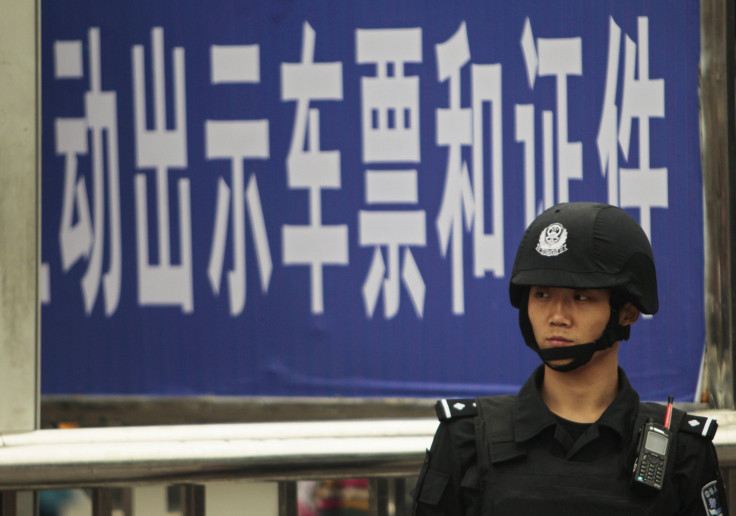China Ramps Up Security After Series Of Train Station Attacks In Guangzhou, Kunming And Urumqi

A knife attack at a train station in the southern city of Guangzhou, China, left six injured after four knife-wielding men began slashing people at random. The violent incident is the most recent in a spate of train station attacks across the country.
According to the Guangzhou police bureau’s official microblog, witnesses said the attackers wore white clothing, including white caps that some say resembled the taqiyah headdress that is sometimes worn by Chinese Muslims. Guangzhou authorities said one of the four assailants was shot and killed by armed police, but authorities have not determined if the attackers were Uyghur, a minority Muslim group in China, whose members have been implicated in past train attacks.
Though only one of the assailants died in the attack and all the victims survived, the violence comes at a time of heightened sensitivity after two violent train station incidents occurred in March and April, which had already left many citizens anxious about the possibility of future attacks. This attack came less than a week after a deadly explosive killed three people outside a train station in the far-western city of Urumqi in what appears to be a suicide bombing. In early March, a group of men and women, reportedly Uyghurs from the restive Xinjiang region, entered a train station in southwestern city of Kunming, armed with long knives. They killed 33 people and left more than 140 with serious injuries.
The series of train station attacks has forced authorities to ramp up security as domestic terrorism threats fuel panic online.
“Guangzhou has become really unsafe!” one user posted on a popular Chinese microblogging service. “Next time I see someone wearing a white hat, I’m heading the other way.”
Train stations have been a major target of attacks because of the minimal amount of security and clearance required to enter train stations, and because they are usually the guaranteed significant foot traffic. After last week’s train bomb, Chinese authorities conducted an anti-terrorism drill in Xinjiang province, near the Kyrgyzstani border, to prepare for a potentially bigger attack. The drill involved several branches of China’s People’s Liberation Army, and it included drones and missiles in its simulated attack on a terrorist camp.
In addition to those preparations, security on the ground has reportedly increased in select areas to prevent future violence. After the Kunming attack, which preceded a series of key political meetings in Beijing, state media reported that leaders held emergency meetings about boosting domestic safety in the capital. Some of the added security measures included adding military personnel to public transportation, including the city’s sprawling network of buses and subways. However, many of the security measures did not last long after the meetings concluded.
Concerns over China’s selective and often ineffective security detailing can be read online on China’s Weibo microblogging service, which is comparable to Twitter.
“I don’t want to feel constantly on edge [by seeing additional personnel], but right now, we needed more security in public places,” one blogger wrote about the security provided by the state.
“We see the police with big guns lining the streets of the train stations after the terrible incidents, never before them,” another wrote.
“Hopefully it won’t be permanent but we need to see more police out there helping prevent attacks, not just cleaning up afterwards!” another added.
The fight against domestic terrorism has become one of the top items on President Xi Jinping’s agenda. Last week, Xi pledged to crack down on terrorism stemming from the Xinjiang area, which the government claims is a center for terrorist group activity in China. Xi visited Xinjiang and met with the province’s party boss, Zhang Chuxian, and they vowed to make counterterrorism a priority for the area.
© Copyright IBTimes 2024. All rights reserved.






















